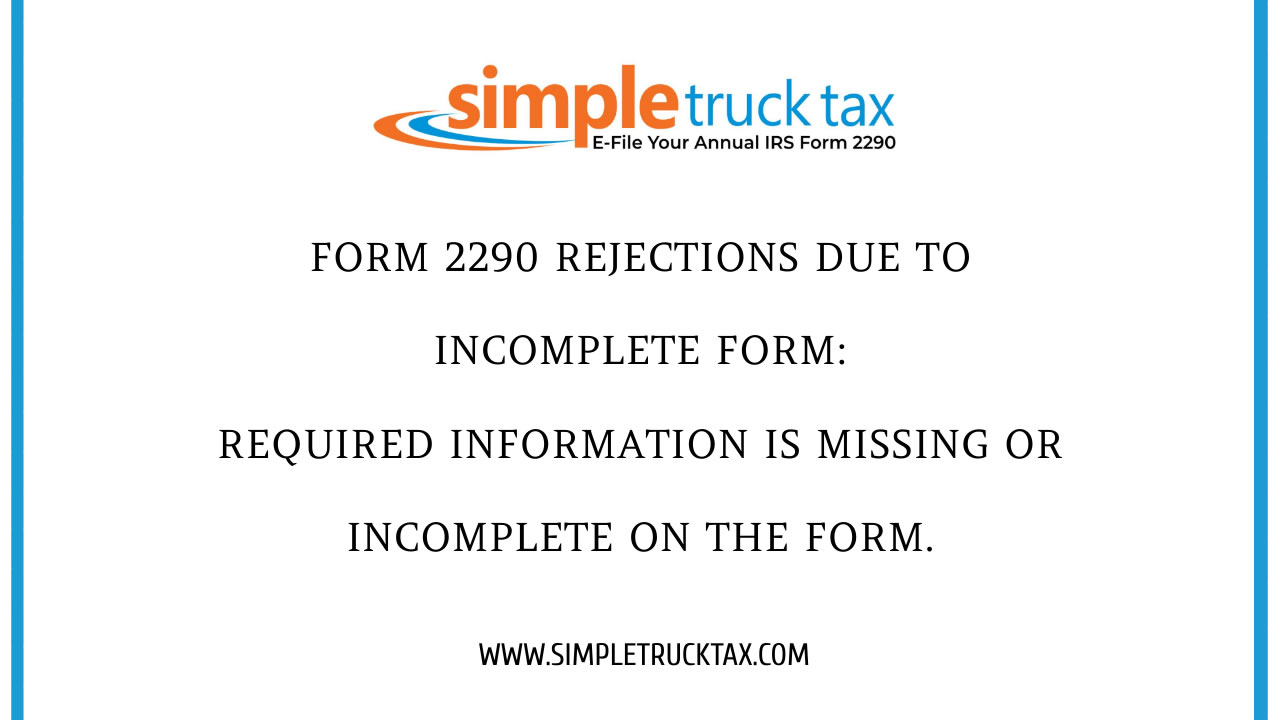
Form 2290 rejections due to Incomplete Form: Required information is missing or incomplete on the form
Understanding Incomplete Form Submissions as a Cause of Form 2290 Rejections
The US truck owners and operators have a task to file Form 2290, also known as the Heavy Highway Vehicle Use Tax Return. It causes rejection sometimes because information would not be complete or is absent on the form. In this article, we will look into common reasons for having your Form 2290 rejected due to incomplete submissions and how you can avoid them.
What is Form 2290?
Truck drivers with vehicles weighing more than 55,000 pounds must submit the IRS’s Form 2290. This form collects payments for and discloses Heavy Vehicle Use Tax (HVUT), an annual tax levied on heavy motor vehicles that ply public highways.
Common Reasons for Form 2290 Rejections
One major reason why most people get their forms rejected is because they are either incomplete or some vital details were omitted from it. There are certain details which an individual must provide according to internal revenue regulations and any omission may result in processing delays if not straight out rejection of submission.
1. Missing Employer Identification Number (EIN)
To fill out IRS’ s form Number 2290 properly; every filer needs to have an EIN. Without a correct EIN your return will not be processed by IRS Common errors are:
- Leaving the space blank
- Typing wrong/invalid EINs
- Using SSNs instead of EINs
2. Incomplete Vehicle Identification Number (VIN)
The VIN number has to be exactly right in its entirety. Mistakes such as:
- Removal of one digit.
- Misinterpretation of the VIN number.
- Incorrect use of the VIN number which does not belong to the reported vehicle.
- Any of these mistakes could lead to dismissal of your Form 2290.
3. Incorrect Tax Period
Each Form 2290 must specify the correct tax period. Doing this incorrectly or omitting it entirely can result in a rejection. Ensure that you:
- Choose the right tax year.
- Accurately state the month when you started using the vehicle on public highways.
4. Missing Signature
A common cause of rejection is absence of signature or an invalid one. The IRS will not process an unsigned form even if all other information is correct. Check that:
- Authorized persons have signed the return.
- Digital signatures are used as appropriate if filing electronically.
5. Incomplete Payment Information
If you are making a tax payment with your Form 2290, every bit of payment information must be given correctly and completely . Some issues include:
- Lacking payment details.
- Wrong method of payment.
- Insufficient funds in an account for drawing the amount indicated in a form to pay taxes to IRS.
How to Avoid Incomplete Form 2290 Rejections
Here are some tips to avoid being frustrated by rejected Form 2290:
- Double-check All Information: It is advisable to review your form before submitting it in order to make sure that all blank spaces are filled out appropriately.
- Use A Checklist: Make use of a checklist either created by yourself or available on different platforms so as to help you ascertain that everything required has been included.
- Consult A Professional: Whenever any part seems unclear, contact a tax professional conversant with requirements applicable in relation to Form 2290 to assist you out.
- File Electronically: Electronic filing systems often include built-in checks that can help prevent common mistakes, reducing the chances of rejection.
To avoid problems, it is important that you correctly and completely fill out Form 2290. If you pay close attention to detail and provide all the necessary information, then there are no common pitfalls that cause forms to be returned. Always take the time to review your submission, or consult with a professional, to ensure a smooth and successful filing process.
Note: For more information, visit IRS website